Streepathon Stop #4: Plenty
"I want to change everything... and I don't know how."
-Susan Traherne
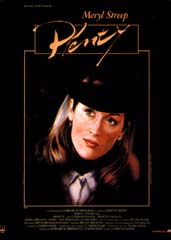 Time: 1985 (11th film)
Time: 1985 (11th film)Role: Susan Traherne, postwar Brit
Awards: none
Fun Fact #1: This is the only film in the Streepathon for which Meryl received no year-end awards or nominations. This is undoubtedly because another of Streep's films, Best Picture winner Out of Africa, was released in the same year.
Fun Fact #2: In Plenty, Streep plays a woman named Susan and works from a script by British playwright David Hare. In 2002, she would again play a woman named Susan (real-life writer Susan Orlean, in Adaptation) and would again work from a script by Hare (The Hours).
Fun Fact #3: Kate Nelligan, a British actress who'd starred in Plenty onstage, was considered for the role of Susan, but director Fred Schepisi ultimately chose Streep, due in part to her American stardom and ability to attract more money.
Streep & Sting: Who'da thunk it? Meryl Streep gets busy with Sting.
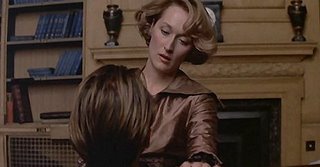
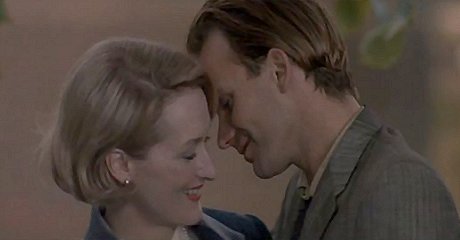
Film Review: This film has been growing on me slowly. I didn't think much of it on first viewing, but the longer I've had it and the more times I've watched it, the higher it's climbed in my esteem. I now see that it's one of Streep's best films, and an underrated wonder of the 80's.
Meryl Streep plays Susan Traherne, a passionate woman living in post-WWII England. The film begins with a scene during the war, where she meets a charming rogue spy (played by Sam Neill) while in France as a special forces agent. The two fall in a sort of love, briefly, before he must leave her unexpectedly. After the war, she returns to England to live, takes a job at a trade office, eventually meets and marries a stodgy diplomat (Charles Dance), befriends a spunky bohemian writer (Tracey Ullman), and tries, for a time, to mother a child with a poor boy from the other side of the tracks (Sting), all the while searching for a fulfillment she can never find. Susan is haunted by memories of her time in the war - a more exciting life - and by the love and adventure she's lost.
She is disappointed by her roles as both working woman and society wife, and suffers fits of fierce anger and resentment, separated by long periods of desperation. There are hints that Susan may have a form of bipolar disorder or other mental ailment, but her husband defends her personality, claiming she "just feels very strongly." This is a plum role for Streep, who seamlessly inhabits the intelligence and neuroses of this woman. David Hare, who wrote both the screenplay and the stage play on which it was based, also wrote the screenplay for The Hours, and there are hints of its three depressed women in Susan.
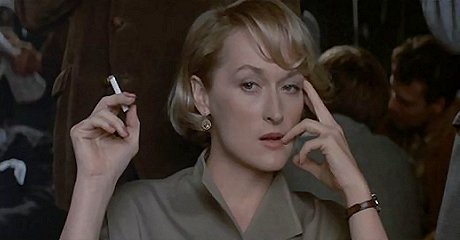
Plenty is a telling of the history of postwar Britain through the eyes of one strong woman, an excellent exercise in the historical-as-personal. The music, by Bruce Smeaton, is hauntingly beautiful with an epic sweep - lush, ravishing, pick an adjective - and adds much to the film's mood. The score was robbed of an oscar nomination (as was Hare's script); the film got no traction at all with awards groups (due, I believe, to a bungled release - see also: Malick's The New World), settling for a pair of BAFTA nods for supporting stars Ullman and John Gielguld, and a pair of critics' awards for Gielguld, who plays Streep's husband's boss, an ambassador. Other than being slow at first and a little dull at times, this is a terrific film, with glorious themes, fine writing and acting, and absolutely gorgeous music. Ultimately it's a film about expectations and disappointment, and the limits with which we must live.
In the film's final scene, a flashback to the end of the war, Susan stands atop a hill and looks around, exclaiming, "There will be days and days and days like this!" ...plenty of good days to come... but of course, she is wrong. That day was the only day like that; he future was not as bright as it seemed. Our lives are rarely as we'd hope them to be... they're usually stuck somewhere between our memories and our dreams. But of those, at least, we have plenty.
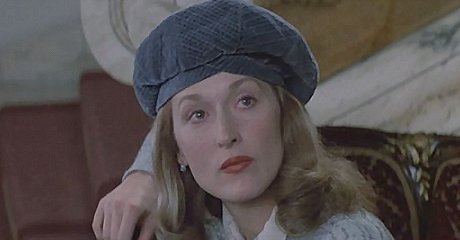 Streep Review: What can I say? Meryl's awesome. I can't help but compare her performance here to her perf in The Hours, as she is working from a David Hare script in both, and in both, playing depressed... and her Plenty perf is definitely the finer. Fred Schepisi talks on the DVD about how thoughts "flicker across her face like clouds through the sky" and it's true. The ease and subtlety with which she expresses her inner emotions is amazing... and it's particularly needed in portraying someone as troubled and enigmatic as Susan. This is one of the more complex parts I've Streep play, and the complexity just makes her so much richer. She feeds off of it - consumes it into her actorly mojo - and then reflects it back at the viewer. It's lovely.
Streep Review: What can I say? Meryl's awesome. I can't help but compare her performance here to her perf in The Hours, as she is working from a David Hare script in both, and in both, playing depressed... and her Plenty perf is definitely the finer. Fred Schepisi talks on the DVD about how thoughts "flicker across her face like clouds through the sky" and it's true. The ease and subtlety with which she expresses her inner emotions is amazing... and it's particularly needed in portraying someone as troubled and enigmatic as Susan. This is one of the more complex parts I've Streep play, and the complexity just makes her so much richer. She feeds off of it - consumes it into her actorly mojo - and then reflects it back at the viewer. It's lovely.Though I must say, once again, that Streep is not as flawless with accents as common wisdom upholds. Once in Plenty, while snapping at Sting, she seems to totally fall out of the British for a moment, before settling back in. I'm surprised her director let her do that; IMO, it was quite noticeable. While she's in dialect, she's usually perfect, though she does have a tendency to break. One hears these things when one's been hearing Meryl nonstop for weeks. It's disappointing, though expected, to some degree. I'm watchin' you, Meryl... no more slip-ups.
But still, slip-ups side, this is one of her best performances, in a stunningly undervalued film. We'll see how it stacks up against what comes...
Next in the marathon: Out of Africa
Labels: Meryl Streep, Plenty, Streepathon


0 Comments:
Post a Comment
<< Home